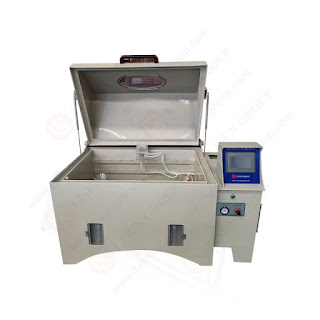What is salt spray corrosion test and what is the use of it?
The Salt Spray Corrosion Test is a procedure that has been standardized and is used to test the resistance of materials and coatings to corrosion. The test evaluates the capacity of the materials and coatings to withstand the corrosive effects of a salt-laden atmosphere, such as those found in marine or coastal areas. This helps determine how well the materials and coatings perform.
The examination is
carried out in a setting that is under strict supervision; normally, this takes
place inside of a salt spray chamber. Inside of this chamber, the test
specimens are subjected to a fine mist of salt spray solution. For the purpose
of simulating a corrosive environment, the salt spray solution is produced by
dissolving sodium chloride (NaCl) in distilled water. Additionally, the test chamber is kept at a certain temperature and level of relative humidity.
The specimens are
examined at certain intervals, and the test is carried out for the whole amount
of time that has been determined. The specimens are analyzed to determine
whether or not corrosion has formed, taking into account the kind, amount, and
distribution of the corrosion. The findings of the test are documented and
reported, and if it is deemed essential, the specimens may be retested in order
to either validate the results or assess how successful the corrosion
prevention methods are.
An evaluation of the
corrosion resistance of materials and coatings, as well as a comparison of the
performance of various materials and coatings in a corrosive environment, may
be accomplished via the use of salt spray testing. The test is often used in a
variety of industries, including the automotive, aerospace, electronics, and
construction sectors, amongst others, to verify the durability and
dependability of items that are subjected to corrosive conditions.
Testing with salt spray
is also used to evaluate the performance of coatings like paints and
electroplated finishes, as well as the efficiency of corrosion protection
measures such the application of anti-corrosion coatings. This is done by
spraying salt on the surface of the test object.
In conclusion, salt spray
corrosion testing is an important method for evaluating the corrosion
resistance of materials and coatings, as well as for ensuring the durability
and reliability of products in corrosive environments. The testing is performed
by spraying a salt solution onto the surface of the material. The test delivers
useful information on the performance of materials and coatings in a simulated
corrosive environment. This information may be utilized to make educated
choices regarding the selection and usage of materials and coatings for
particular applications.

.jpg)
Comments
Post a Comment